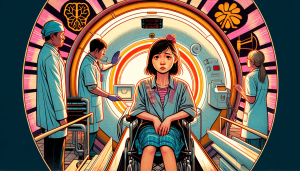
Multiple Sclerosis (MS) is a chronic, often disabling disease that affects the central nervous system (CNS), disrupting the flow of information between the brain and the body. It is a complex condition with a wide range of symptoms and progression patterns that vary from person to person. This variability often makes MS a challenging condition to diagnose and manage.
What is Multiple Sclerosis?
MS is an autoimmune disorder in which the immune system mistakenly attacks the protective sheath (myelin) that covers nerve fibers, resulting in communication problems between the brain and the rest of the body. The damage caused to the myelin can lead to the formation of scar tissue (sclerosis), disrupting or blocking nerve signals.
Types of Multiple Sclerosis
There are several forms of MS, each with its own characteristics:
- Relapsing-Remitting MS (RRMS): This is the most common form of MS, characterized by clearly defined relapses or flare-ups followed by partial or complete recovery periods.
- Primary-Progressive MS (PPMS): In this form, the disease progresses steadily without distinct relapses or remissions.
- Secondary-Progressive MS (SPMS): Many people diagnosed with RRMS will eventually transition to this stage where the disease progresses more steadily, with or without relapses.
- Progressive-Relapsing MS (PRMS): This is a rare form characterized by a steady worsening of the disease from the beginning, with occasional relapses and recoveries.
Symptoms of MS
MS symptoms can vary widely and may include:
- Fatigue
- Weakness
- Numbness or tingling
- Problems with coordination and balance
- Muscle spasms
- Issues with cognitive function
- Bladder or bowel dysfunction
- Visual disturbances
- Pain
Causes and Risk Factors
The exact cause of MS is still unknown, but a combination of genetic, environmental, and immunological factors is believed to play a role. Certain factors may increase the risk of developing MS, including:
- Genetics: A family history of MS can increase the likelihood of developing the condition.
- Environmental factors: Factors such as low vitamin D levels, smoking, certain infections, and exposure to certain toxins might contribute to the risk of MS.
- Autoimmune response: The immune system’s response against the body’s own tissues, including the central nervous system, is thought to be a significant factor.
Diagnosis and Treatment
Diagnosing MS can be challenging, as there isn’t a single test to confirm it. A combination of medical history, neurological exams, MRI scans, and other tests is usually required.
While there isn’t a cure for MS, various treatments aim to modify the disease course, manage symptoms, and improve the quality of life for individuals living with MS. Medications, physical therapy, occupational therapy, and lifestyle changes are often employed to help manage symptoms and slow the progression of the disease.
Living with MS
Living with MS can be challenging, but it’s possible to lead a fulfilling life. Support groups, counseling, and lifestyle modifications can help individuals cope with the physical, emotional, and social impacts of the disease.
Research and Future Outlook
Advancements in research continue to expand our understanding of MS and improve treatment options. Ongoing studies focus on finding new therapies, better understanding the disease mechanisms, and exploring ways to enhance the quality of life for those affected.
Conclusion
Multiple Sclerosis is a complex and multifaceted condition that varies greatly among individuals. While it poses significant challenges, advancements in research and treatment offer hope for a better quality of life for those living with MS. Raising awareness, providing support, and continuing research efforts are crucial in the journey toward managing and ultimately conquering this condition.

